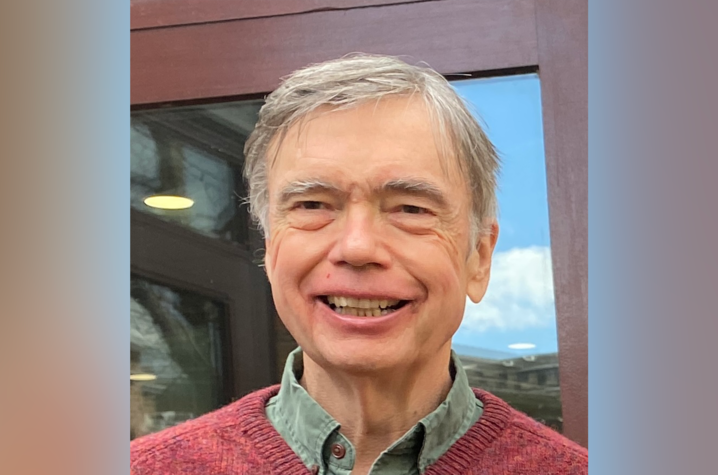UK’s Gary Ferland receives astronomy’s highest lifetime achievement award

LEXINGTON, Ky. (Sept. 19, 2025) — University of Kentucky physics and astronomy professor Gary J. Ferland, Ph.D., has been named the 2025 recipient of the Catherine Wolfe Bruce Gold Medal, the highest honor awarded by the Astronomical Society of the Pacific (ASP).
The Bruce Medal, first awarded in 1898, recognizes a lifetime of outstanding achievement and contributions to astrophysics research. Past recipients include some of the most influential names in astronomy, such as Edwin Hubble, Vera Rubin, and Nobel laureates Hans Bethe and Willy Fowler.
Ferland, who has taught at UK’s Department of Physics and Astronomy in the College of Arts and Sciences for more than four decades, is best known for developing Cloudy, a computer code that has become one of the most widely used tools in astrophysics. The program helps researchers around the world interpret astronomical observations from both ground-based and space telescopes, offering insights into cosmic environments ranging from the Orion Nebula to the energetic regions around black holes.
The ASP acknowledged Cloudy as a tool that has transformed astronomers’ ability to model and understand the complex gases and radiation that make up the universe. Funding from the U.S. National Science Foundation, NASA and the Space Telescope Science Institute supported Cloudy.
“Although the initial work began 40 years ago, it continues to be updated and remains a powerful tool in the spectral analysis of gases and plasmas,” the ASP said in its announcement.
In addition to his groundbreaking research, Ferland has authored more than 700 publications with over 40,000 citations, trained generations of astronomers, and shared his passion for the night sky with audiences ranging from research students to cruise ship passengers. He has received several awards and honors, including the 2016 Albert D. and Elizabeth H. Kirwan Memorial Prize for research from UK. He was elected a Fellow of the American Association for the Advancement of Science in 2022 and named a Fellow of the American Astronomical Society.
“[The Bruce Medal] is the most prestigious recognition of my career,” Ferland said. “I’m honored to be included among the astronomers who have shaped our field for more than a century.”
The honor also comes with a celestial namesake: an asteroid has been named “30521 Garyferland” in recognition of his contributions — believed to be the first asteroid named after a UK faculty member.
“It’s about the same size as the one that killed off the dinosaurs,” Ferland joked, “but don’t worry, it is in a safe orbit between Mars and Jupiter.”
In addition to his research, Ferland leads international Cloudy workshops that train the next generation of astronomers. While many modern graduate programs emphasize gravitational and particle physics, Ferland’s workshops focus on light — the primary way astronomers study the universe. He has organized sessions across the globe, including a workshop hosted by the Japanese Space Agency at its Tokyo headquarters and most recently at UK’s Gatton Student Center, which drew participants from around the world.
Ferland and his faculty colleagues also help bring astronomy to the public through UK’s MacAdam Student Observatory (MSO), which serves students, researchers and the broader community. The MSO enriches classroom learning, provides opportunities for undergraduates to study exoplanets and stars, and hosts “Sky Talk” every second Thursday of the month. These public programs combine illustration-rich talks with observation sessions, making astronomy accessible and inspiring to the local community.
"Not only has Gary's work revolutionized astronomy, it introduced generations of students to cutting edge research techniques and launched the careers of emerging scientific leaders in the field,” said Renee Fatemi, chair of the Department of Physics. “Needless to say, the entire department is very excited and proud to say that Gary has made his academic home at the University of Kentucky."
Ferland will be formally recognized at the ASP Awards Gala on Nov. 8, in Burlingame, California.
Read more at https://astrosociety.org/who-we-are/awards/catherine-wolfe-bruce-gold-medal.html.
The Astronomical Society of the Pacific, founded in 1889 and based in San Francisco, is one of the oldest and most respected astronomy organizations in the world. Its annual awards celebrate excellence in research, education and public engagement in astronomy.
Research reported in this publication was supported by the U.S. National Science Foundation under Award No. 1910687. The opinions, findings, and conclusions or recommendations expressed are those of the author(s) and do not necessarily reflect the views of the U.S. National Science Foundation.
The material is based upon work supported by NASA under award Nos 80NSSC20K0536 and 80NSSC23K0461. Any opinions, findings, and conclusions or recommendations expressed in this material are those of the author(s) and do not necessarily reflect the views of the National Aeronautics and Space Administration.
This work is based [in part] on observations made with the NASA/ESA/CSA James Webb Space Telescope. The data were obtained from the Mikulski Archive for Space Telescopes at the Space Telescope Science Institute, which is operated by the Association of Universities for Research in Astronomy, Inc., under NASA contract NAS 5-03127 for JWST. These observations are associated with program # JWST-GO-05354.002-A, JWST-AR-06419.001-A, JWST-AR-06428.001-A and JWST-GO-05018.005-A.
As the state’s flagship, land-grant institution, the University of Kentucky exists to advance the Commonwealth. We do that by preparing the next generation of leaders — placing students at the heart of everything we do — and transforming the lives of Kentuckians through education, research and creative work, service and health care. We pride ourselves on being a catalyst for breakthroughs and a force for healing, a place where ingenuity unfolds. It's all made possible by our people — visionaries, disruptors and pioneers — who make up 200 academic programs, a $476.5 million research and development enterprise and a world-class medical center, all on one campus.




